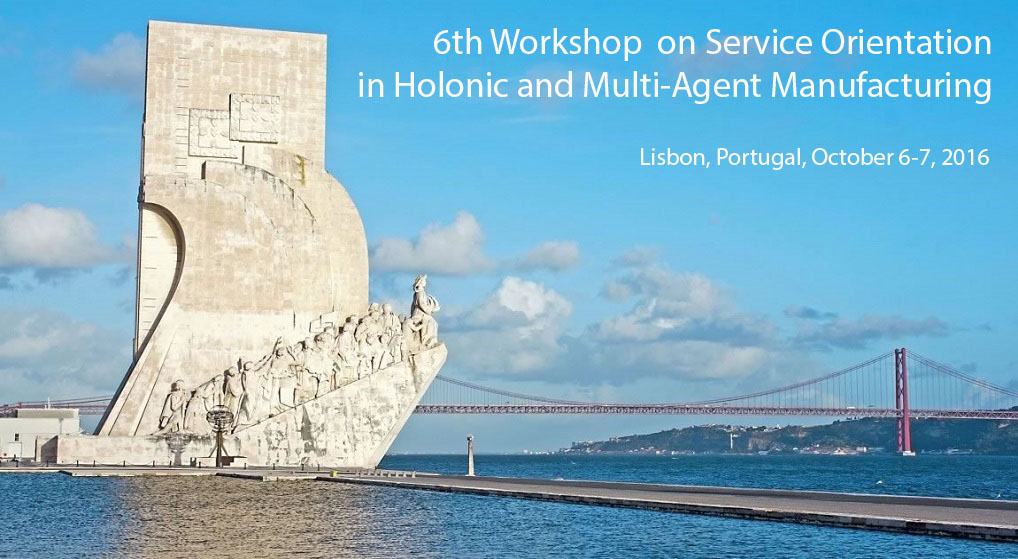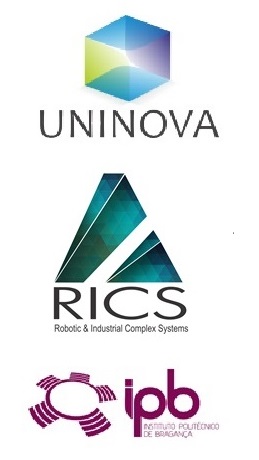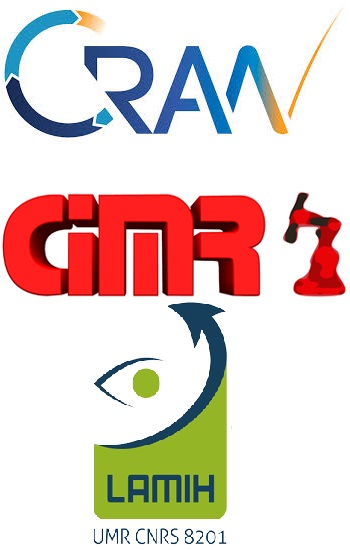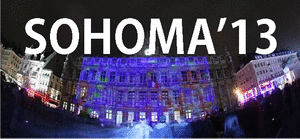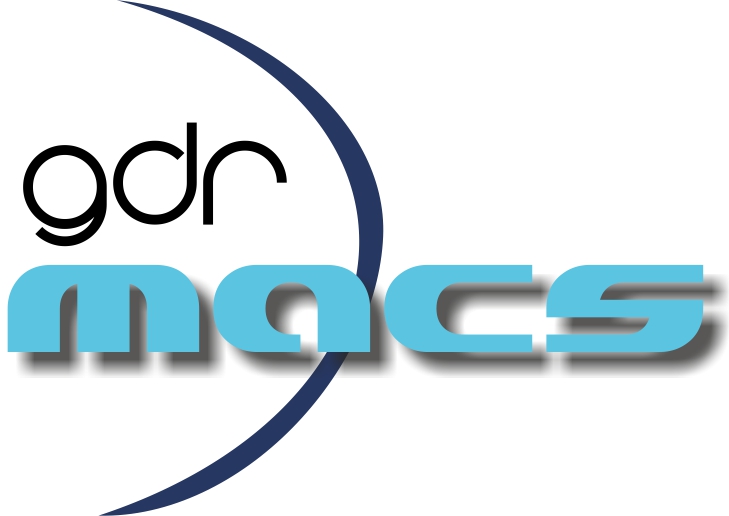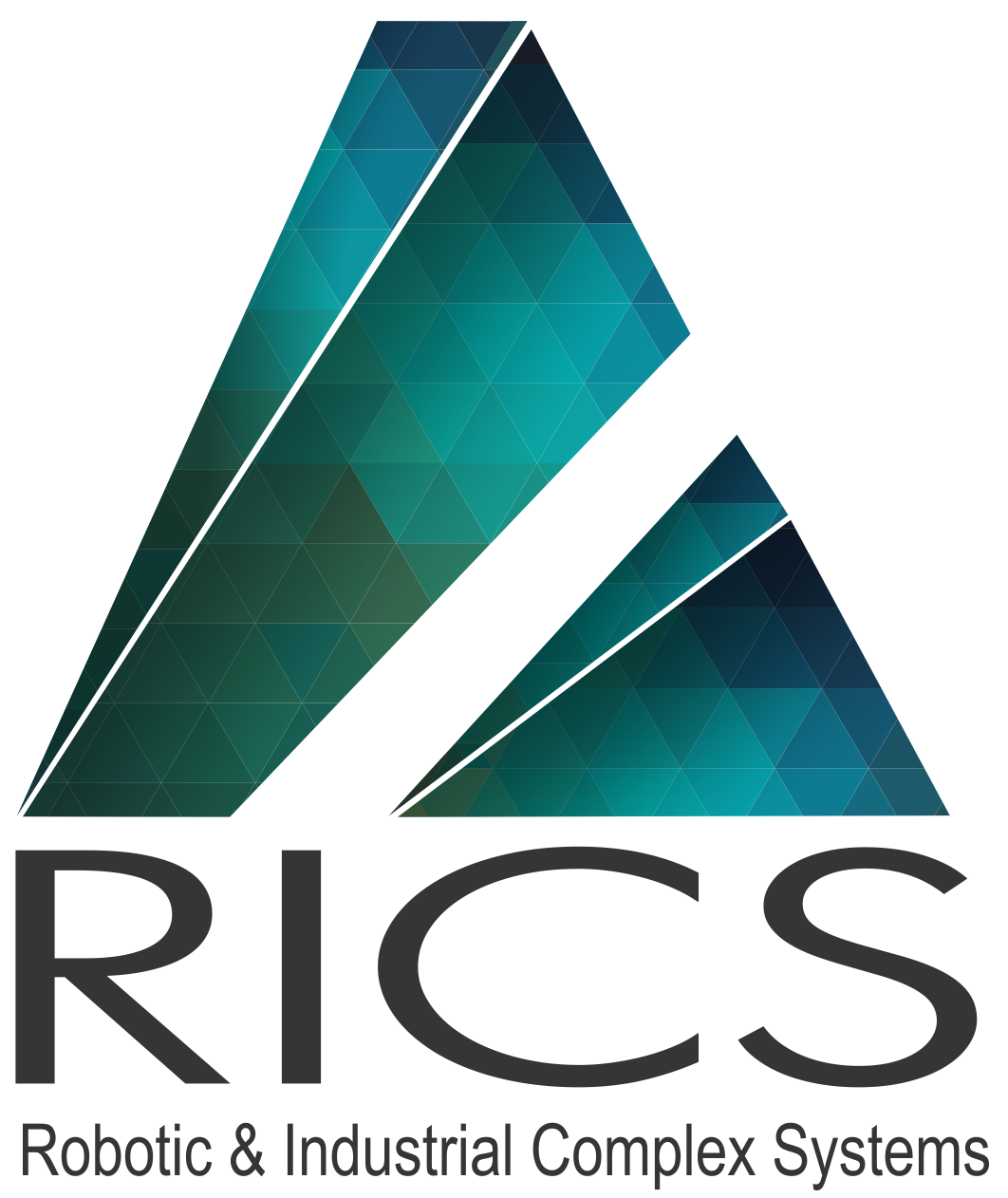About the Workshop
It is our pleasure to invite you to participate in the SOHOMA’16 Workshop on Service Orientation in Holonic and Multi-Agent Manufacturing, organized by the New University of Lisbon in collaboration with University Politehnica of Bucharest (the CIMR Research Centre in Computer Integrated Manufacturing and Robotics), University of Valenciennes and Hainaut-Cambrésis (the LAMIH Laboratory of Industrial and Human Automation control, Mechanical engineering and Computer Science) and University of Lorraine (the CRAN Research Centre in Automation of Nancy). SOHOMA has the scientific support from GdR-MACS and the IEEE Industrial Electronics Society Technical Committee on Industrial Agents.
The main objective of the SOHOMA’16 Workshop is to foster innovation in sustainable manufacturing and in this context to promote concepts, methods and solutions addressing trends in the service orientation of agent-based control technologies with distributed intelligence and the integration with enterprise management.
The Workshop's Theme
The theme of the SOHOMA’16 Workshop is “Distributed, agent-based intelligent control in service-oriented architectures for the digital transformation of manufacturing”.
Markets are currently imposing very strong requirements, demanding customized high-quality products with shorter delivery times and shorter lifecycles, forcing companies to adapt their processes by help of flexible, safe and reconfigurable production plants and supply chains. This leads to the challenge of designing production systems that exhibit better re-configurability, agility, robustness, resilience and responsiveness while ensuring also long-term performances and sustainability of their products, processes, and related services. In addition, there is a shift from pure goods dominant logic to service dominant logic which led to service orientation in manufacturing, and influencing the design, execution and utilization of the physical product as vehicle for delivering generic or specific services related to that product (in "Product-Service Systems").
These challenges are addressed by the new vision on the digital transformation of manufacturing.
In this context, the technological evolution in ICT enabled researchers to develop new emerging concepts and implementing solutions that were not even conceivable in the past. They are based on the interaction of a multitude of various, interconnected and even decision-capable “smart” objects (belonging to the industrial and / or logistic systems), embedded or distant, cyber-physical or purely digital. These “bottom-up” approaches may lead to emerging behaviour that must be controlled and integrated with existing, more “top-down” approaches, being most of the time centralized or hierarchy-based management systems. These emerging ICT concepts may also generate new challenging issues but powerful solutions to problems unsolved by classical approaches.
This SOHOMA’16 Workshop intends to put the focus on these challenges and solutions and especially, on the way emerging “bottom-up” behaviours are integrated with “top-down” approaches in an efficient and effective way to constitute a kind of hybrid control system useful to meet industrial and service needs.
Novel solutions will change the manner in which manufacturing systems are coupled and interact. Distributed intelligence is a first aspect of such novel approaches. It is necessary if only because in a multi-organization setting, organizations will not accept to yield control over their own data and information processing. Service orientation provides answers because it decouples while shielding the internal aspects and it generalizes what can be employed, activated and recruited amongst different organizational entities. It also makes functionalities (services) available in smaller composeable and orchestrateable chunks. Furthermore, direct integration, interaction and coordination of enterprises (resources) are unlikely to scale in a dynamic and demanding environment. It requires too much knowledge beyond knowing one-self.
The workshop analyses how multi-agent systems (MAS) and holonic manufacturing execution systems (HMES) contribute together to safe and sustainable manufacturing. MAS represent the main technology used to set up and maintain an efficient resource service model at shop floor level. This model, updated whenever disturbances occur and used in real-time by the holonic manufacturing control system, may solve myopia in resource allocation for optimized production and low energy consumption. Sustainability will be addressed in the workshop with respect to: cost efficiency of production, high and balanced utilization of resources; high availability of capacities and fault-tolerance to disturbances; energy efficiency at shop floor level; robot services and vision-based quality control of products.
Service orientation of technology and management applied to enterprise have gained attention in the past years, promising a way to create the basis for enterprise integration so that companies can deliver new, more flexible business processes that harness the value of service approach from a customer's perspective. Service-oriented Enterprise Architectures (SOEA), customer and supplier relationship management, shop floor engineering, planning, control and maintenance and enterprise management and networking are not limited to just Web services, technology and technical infrastructure either. Instead, they reflect a new way of thinking about processes that reinforce the value of commoditization, reuse, semantics and information, and create business value in a sustainable way.
Intelligent Information Technologies will be for sure proposed in the SOHOMA’16 event. They will bring into discussion the state-of-the-art and progress for smart, safe and sustainable manufacturing value chain by pursuing a set of research priorities along the main research and innovation lines:
- Dynamic and Green Infrastructure: Intelligent control infrastructures that are distributed / embedded, secure, adaptable and dynamically reconfigurable, optimizing resource usage for energy and space efficiency (adaptive and smart manufacturing systems).
- New Intelligence and Smart Work: Efficient data fusion using big data and context-sensitive information processing tools; adapting legacy plant equipment into reconfigurable resource teams in order to increase productivity and agility to business processes changes; knowledge and human expertise integration; cyber-physical systems.
- Industrial Internet and Virtual Factory: Novel management of interconnected supply chains across manufacturing sites; material flow instrumenting, product traceability and transport tracking, “intelligent product” technologies; logistics across the product life cycle including field operations; IoT and IoS.
There is a trend towards computing-oriented manufacturing, which will be a subject of the Workshop. Big data can help manufacturers reduce product development time and eliminate defects prior to production through simulation and testing (the Digital Enterprise viewpoint). Using real-time data, companies can also manage demand planning across extended enterprises and global supply chains. Overall, big data provides a means to achieve dramatic improvements in the management of the complex, global, extended value chains (the Virtual Enterprise viewpoint) that are becoming prevalent in manufacturing and to meet customers’ needs in innovative and more precise ways, such as through collaborative product development based on customer data.
Research related to big data challenges is of interest for the Workshop: (1) Handling Big Data for the Contextual Enterprise: to continue achieving high levels of productivity growth, manufacturers will need to leverage large datasets to drive efficiency across the extended enterprise and to design and market higher-quality products; (2) Coping with the heterogeneous nature of industrial systems and their on-line interactive nature in combination with competitive pressures (e.g. off-line plans are known to become invalid within minutes after arriving on the factory floor); (3) Orienting the manufacturing integration framework on resource virtualization to establish a comprehensive, Internet-scale platform for networked management and production that will encapsulate the right abstractions to link effectively and scalable the various stakeholders (product firms, manufacturing plants, material and component providers, technology providers, key services).
At global conceptual level, the Virtual World and Physical World of digital manufacturing are integrated via Internet, and therefore:
- Each physical entity having its software representation, synchronization is needed.
- Connectivity from any element of virtual world to any embedded element of the physical world should be enabled.
- Smooth transfer of control (migration) from virtual to physical world is of key importance.
The purpose of the SOHOMA'16 international workshop, which is the sixth one in the series of SOHOMA scientific events, is to shed light on the multiple issues above, associated with safe, smart and sustainable products, processes and industrial systems, distribution of intelligence in enterprise management and production control, and integration of business and technical processes in the manufacturing value chain through agent orientation, virtualization and service-oriented technologies.
Workshop Topics
The papers presented at the SOHOMA 2016 Workshop will cover the following topics:
- Customer-oriented logistics
- Intelligent Manufacturing Systems
- Modelling of discrete event systems in manufacturing
- Multi-Agent Systems in industry
- Distributed Intelligence and product driven automation
- Holonic Manufacturing Execution Systems
- Intelligent Products: concepts, architecture, implementation, use cases
- Internet of Things / Physical Internet
- Swarm intelligence in manufacturing
- Industrial Internet and digital manufacturing
- Dynamic and green infrastructure for sustainable manufacturing
- Operational research applications in CAD/CAM/CAE
- Predictive maintenance and risk management in manufacturing
- Mixed production planning and scheduling
- Predictive resource maintenance
- Virtual factory, supply chains and logistics
- Manufacturing Integration Framework
- Cloud Manufacturing and resource virtualization
- Computing and Service Oriented manufacturing
- Servitization and Product-Service Systems (PSS)
- Multi-robot systems in manufacturing
- Bio-inspired theories for smart manufacturing and evolutionary robotics
- Big Data and the contextual enterprise
- Cyber-Physical Manufacturing Systems and Industry 4.0
Publication of Workshop Papers
All papers accepted for presentation will be included in an electronic Preprints volume (on e-key) and distributed to the participants at the conference time, together with a book of abstracts.
All papers duly presented at the Workshop will be included in the SOHOMA'16 post conference Proceedings published in Springer. Selected papers will be proposed for publication in journals.
The Proceedings volumes of SOHOMA’11-SOHOMA’15 previous events, published in special issues of the Springer Book series “Studies in Computational Intelligence” have been included in Scopus, ISI Proceedings and the DBLP Computer Science Bibliography (University of Trier, Germany).
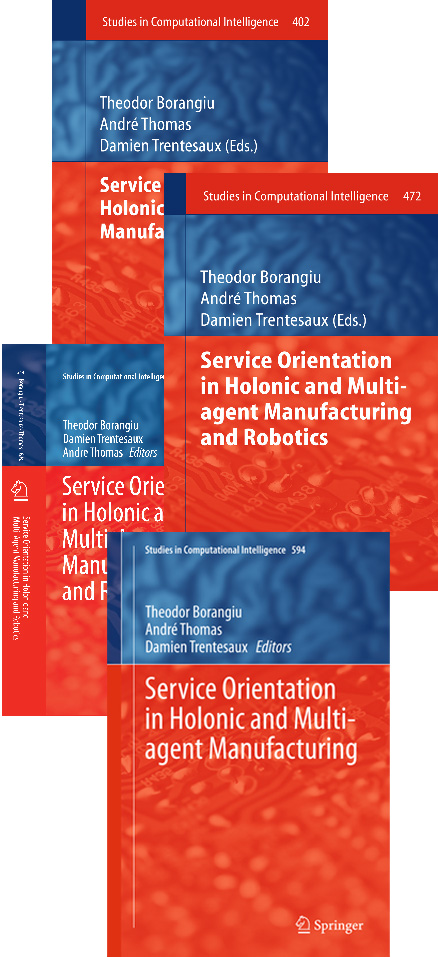 |
SOHOMA'11 Service Orientation in Holonic and Multi Agent Manufacturing Control Series: Studies in Computational Intelligence, Vol. 402, 2012 Borangiu, Theodor; Thomas, Andre; Trentesaux, Damien (Eds.) ISBN: 978-3-642-27448-0 (Print) 978-3-642-27449-7 (Online) SOHOMA'12 Service Orientation in Holonic and Multi Agent Manufacturing and Robotics Series: Studies in Computational Intelligence, Vol. 472, 2013 Borangiu, Theodor; Thomas, Andre; Trentesaux, Damien (Eds.) ISBN: 978-3-642-35851-7 (Print) 978-3-642-35852-4 (Online) SOHOMA'13 Service Orientation in Holonic and Multi Agent Manufacturing and Robotics Series: Studies in Computational Intelligence, Vol. 544, 2014 Borangiu, Theodor; Thomas, Andre; Trentesaux, Damien (Eds.) ISBN: 978-3-319-04734-8 (Print) 978-3-319-04735-5 (Online) SOHOMA'14 Service Orientation in Holonic and Multi Agent Manufacturing Series: Studies in Computational Intelligence, Vol. 594, 2015 Borangiu, Theodor; Thomas, Andre; Trentesaux, Damien (Eds.) ISBN: 978-3-319-15158-8 (Print) 978-3-319-15159-5 (Online) |
